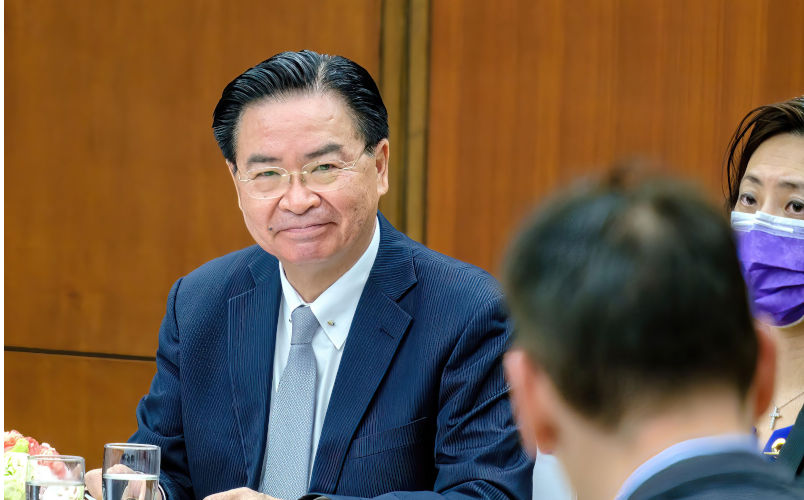Australia is one trade deal away from backing authoritarians, says Taiwan
August 29, 2025
In the grand tradition of diplomatic overreach, Taiwan’s deputy foreign minister recently offered some sweet and spicy talking points to our media: semiconductors are tanks, China is akin to WWII Germany, and if Australia doesn’t fast-track Taiwan into the CPTPP, we might all wake up speaking Mandarin under a fascist AI regime, as reported by News Corp and 7 News.
Francois Chih-chung Wu, Taiwan’s Deputy Foreign Minister and former ambassador to France, warned that Beijing aims to “weaponise the Taiwanese chips capability to rule the world”, drawing a direct comparison to Nazi Germany’s annexation of Czechoslovakia in 1938.
“Germany obtained the industrial power of Czechoslovakia. Then they invaded Poland and France using tanks made in Czechoslovakia.”
It’s a stirring comparison – provided one has never encountered a semiconductor, studied military procurement or opened a history book.
Whatever divides the two sides of the Strait today, their histories remain intertwined. Both were victims of Axis aggression – colonised, bombed and brutalised during one of the darkest chapters of the 20th century. It is written in blood and that legacy deserves more respect than rhetorical theatrics.
It’s worth noting — as even many China-watchers across the spectrum quietly do — that China’s record of initiating full-scale wars is limited to a single brief conflict with Vietnam in 1979. Since then, while there have been ongoing border tensions and maritime disputes, its military restraint in terms of outright armed conflict is notable.
That’s what makes the recent claim of “world domination via chips” feel less like a sober threat assessment and more like geopolitical theatre.
So, for a sitting Taiwanese official to invoke Nazi Germany — not in mourning for shared trauma, but as a blunt rhetorical weapon — is, at best, historically incoherent. At worst, it’s a provocation masquerading as diplomacy. It doesn’t ease tensions. It pours accelerant on them.
Beyond the historical amnesia lies a deeper misunderstanding of how modern warfare actually works. Wu’s breathless warning about China “weaponising” Taiwan’s advanced chip industry ignores a basic fact: most defence systems don’t require cutting-edge semiconductors.
Fighter jets, missile guidance systems and naval platforms typically run on older, more durable chip architectures – the kind China already manufactures domestically. The notion that Beijing’s military depends on access to Taiwan’s 2-nanometre processors is rather like suggesting the Australian Defence Force would grind to a halt without the latest iPhone.
Yes, advanced semiconductors matter immensely for artificial intelligence, global competitiveness and economic power. But the idea that seizing TSMC would instantly hand China military supremacy belongs more to science fiction than serious strategic thinking.
And that’s where the danger really lies – not just in the analogy itself, but in the type of binary thinking it demands. Wu’s comments force countries like Australia to choose sides not based on interest or principle, but on cartoon-villain narratives.
This kind of pressure doesn’t help Taiwan. It risks undermining its case.
China remains Australia’s largest trading partner, with more than $325 billion in annual two-way trade. Taiwan ranks 12th, at about $30 billion. Both relationships matter. Both deserve adult management. Neither benefits from being reduced to wartime metaphors and cosplay diplomacy.
Australia’s interests are not served by joining other people’s historical fantasies. We need boring, practical policies: supply chains that don’t fall apart during a press conference, trade rules that survive contact with ideology and foreign policy crafted by people who know the difference between a semiconductor and a Sherman tank.
Most of all, we need to remember that respecting historical fact isn’t appeasement – it’s basic competence. When political actors start ransacking history for whatever analogy fits the moment, it’s usually because they’ve stopped thinking seriously about the present.
Wu’s Nazi comparisons reflect something deeper about today’s strategic communications environment. When diplomats offer perfectly engineered soundbites designed to go viral and rile up certain audiences, it’s often a sign their arguments can’t stand on their own.
These comments weren’t made to inform. They were made to provoke. To frame complexity as cowardice. To render nuance illegible.
Australia’s political and media establishment should recognise the tactic for what it is. When someone hands you a ready-made headline that flatters your worldview and inflames your audience, they’re usually trying to sell you something you don’t actually need.
Cross-strait tensions deserve serious attention. Semiconductor supply chain resilience matters enormously. The regional military balance is no laughing matter. But none of these problems are solved by moral posturing or re-enactments of the 1940s.
They require diplomacy. Patience. Pragmatism. And strategic thinking that reflects the messy, multipolar world we actually live in – not the one scripted for clickbait geopolitics.
The real world doesn’t come with heroes and villains clearly labelled. Neither should our media and foreign policy. Time to put down the script and start thinking for ourselves.
The views expressed in this article may or may not reflect those of Pearls and Irritations.

